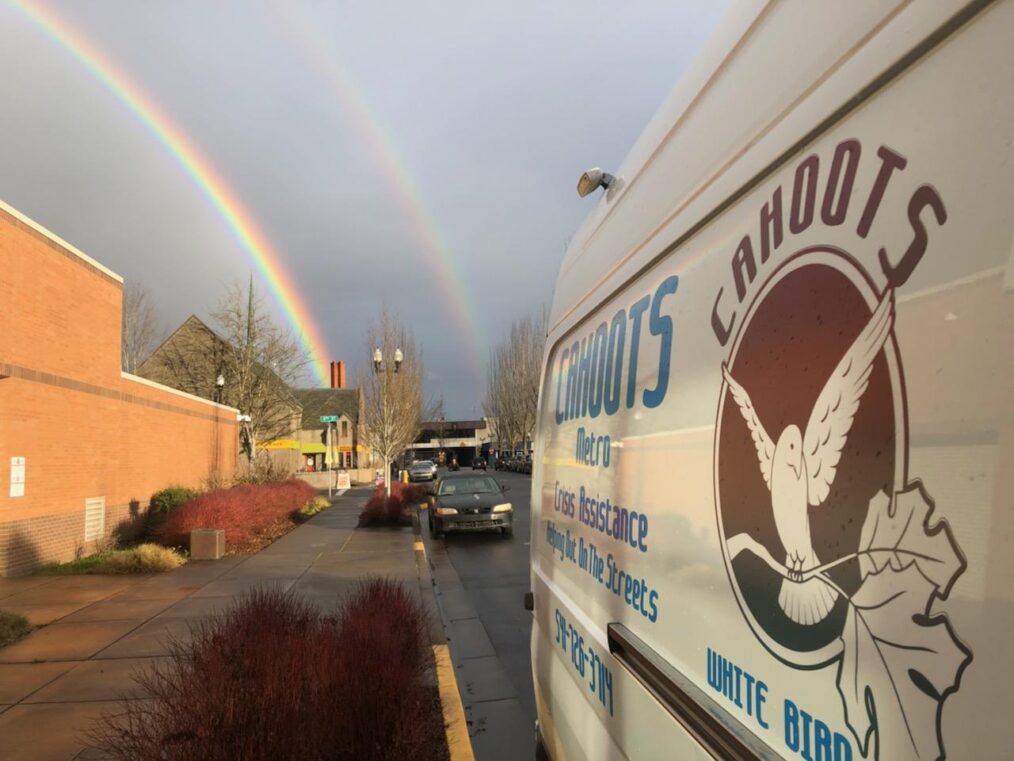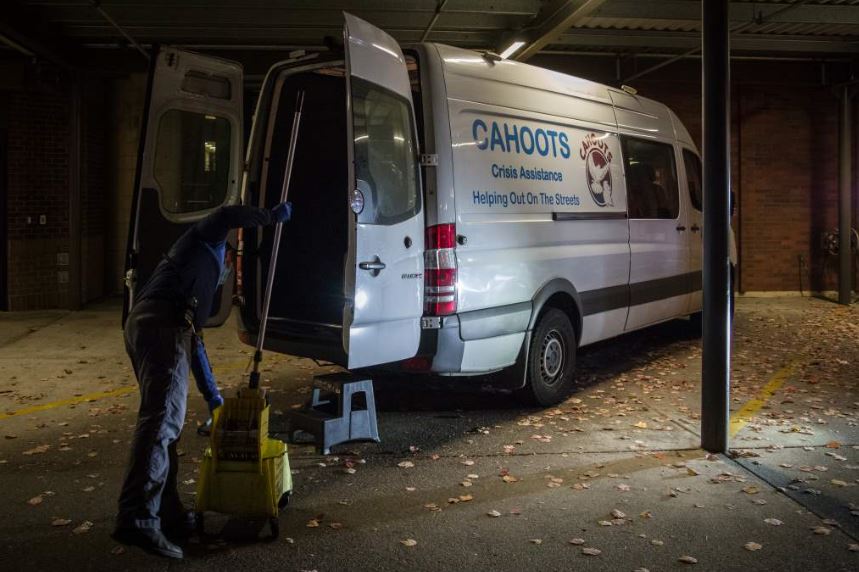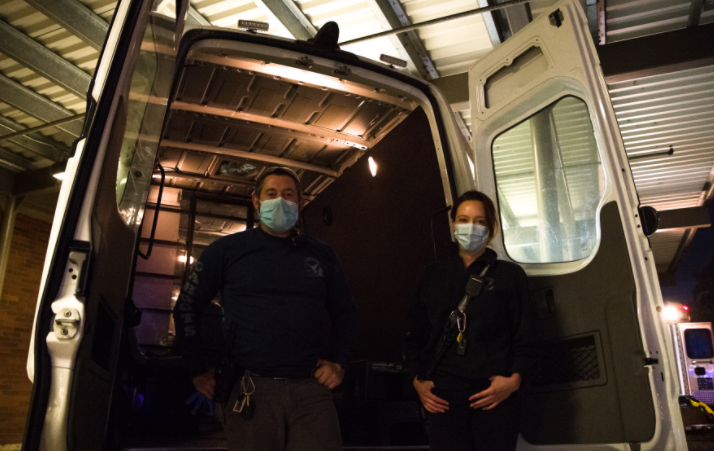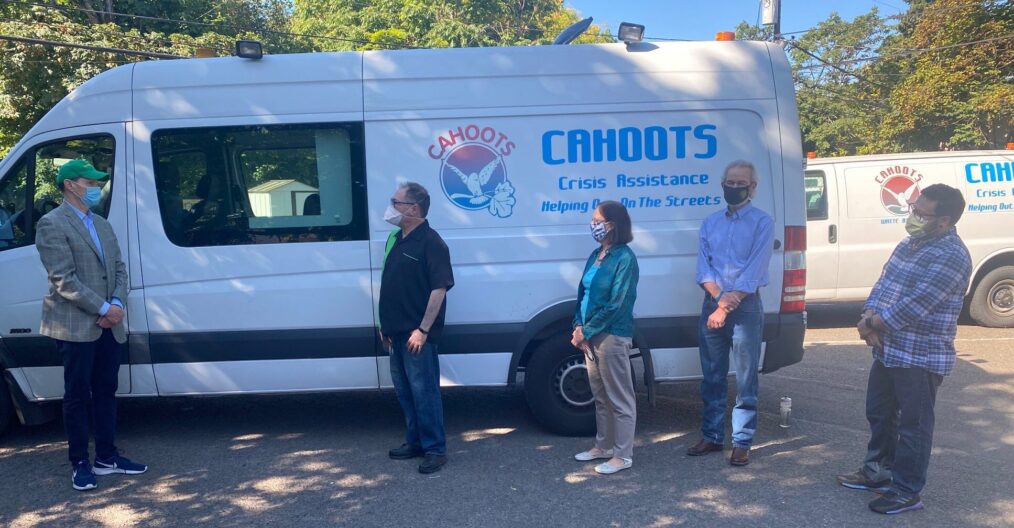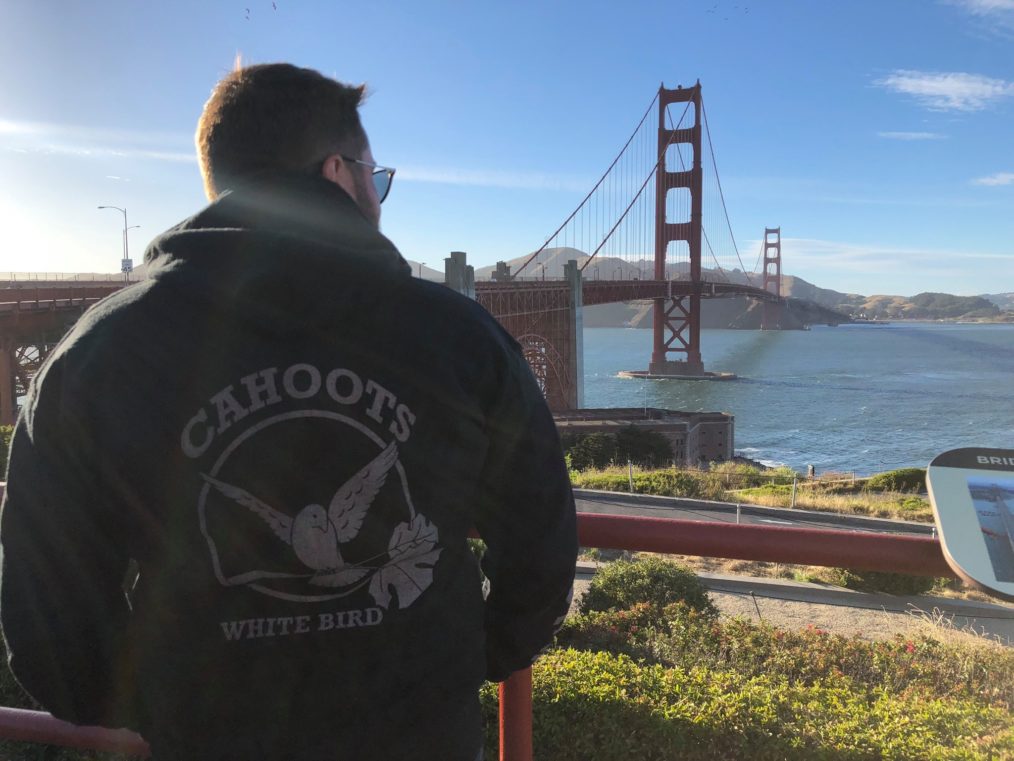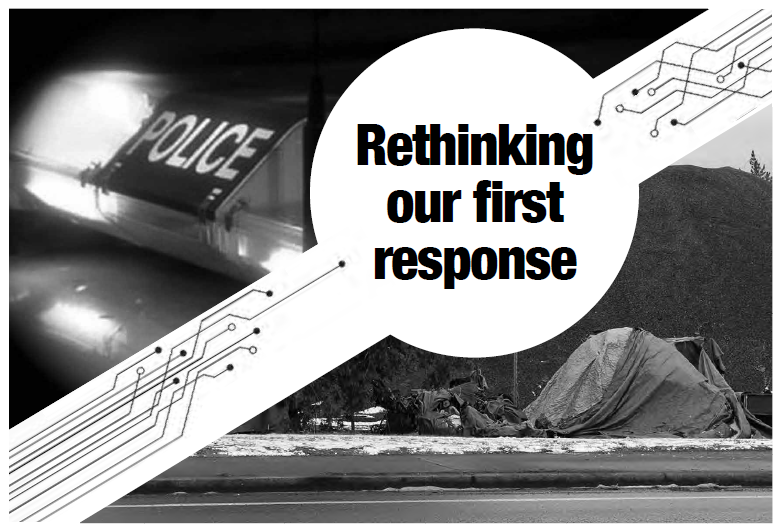Vox’s daily news explainer podcast featured White Bird Clinic’s CAHOOTS program, and how it has been an effective alternative to police involvement in mental health crises for 30 years.
Shout out from artist and musician David Byrne.
Press Release from Jeff Merkley, US Senator for Oregon
After Down Payment on the Policy Included in Reconciliation Relief Legislation, CAHOOTS Act Builds on Proven Models to Help Americans with Mental Illness and Enhances Medicaid Funding to States
Washington, D.C. – Senate Finance Committee Chair Ron Wyden, D-Ore., Senator Catherine Cortez Masto, D-Nev., and six senators today proposed a bill to help states adopt mobile crisis response teams that can be dispatched when a person is experiencing a mental health or substance use disorder (SUD) crisis instead of immediately involving law enforcement. The funding is provided through an enhanced federal match rate for state Medicaid programs.
“I’m proud there is a down payment on CAHOOTS in the emergency relief package moving through Congress now,” Wyden said. “Every day there are stories across the country of Americans in mental distress getting killed or mistreated because they did not receive the emergency mental health services they needed. White Bird Clinic in Eugene, Oregon has been a pioneer for years in this area, and it’s high time the CAHOOTS model is made available to states and local governments across the country. I am eager to get the down payment signed into law and continue working to get further investments in mobile crisis services made under the bill across the finish line.”
“Individuals experiencing a behavioral health crisis deserve to be treated with compassion and care by health care and social workers,”Cortez Masto said. “These professionals are extensively trained in deescalating situations and addressing mental health crises, and this legislation would help more states across the country fund mobile crisis teams. I’m hopeful that these investments in community-based crisis intervention services will be included in the final version of the current coronavirus relief package, and I’ll continue to advocate for effective, trauma-informed care for those in need.”
Earlier this month, the House Energy and Commerce Committee included a provision in its budget reconciliation language for COIVD-19 relief that makes an investment in these services by funding state Medicaid programs at an enhanced 85 percent federal match if they choose to provide qualifying community-based crisis intervention services and funding state planning grants to apply for the option. The pandemic has taken a serious toll on the mental health and wellbeing of Americans with studies showing a four-fold increase in the rates of anxiety and depressive disorders since the beginning of the pandemic.
The CAHOOTS program pioneered by Oregon’s @WhiteBirdClinic has shown us a safe and effective alternative to using law enforcement in mental health crises. I’m proposing legislation to expand this model nationwide and modernize our country’s outdated approach to crisis treatment.
— Ron Wyden (@RonWyden) February 18, 2021
The bill, the Crisis Assistance Helping Out On The Streets (CAHOOTS) Act, grants states further enhanced federal Medicaid funding for three years to provide community-based mobile crisis services to individuals experiencing a mental health or SUD crisis. It also provides $25 million for planning grants to states and evaluations to help establish or build out mobile crisis programs and evaluate them.
Senators Jeff Merkley, D-Ore., Bob Casey, D-Pa., Tina Smith, D-Minn., Dianne Feinstein, D-Calif., Sheldon Whitehouse, D-R.I., and Bernie Sanders, D-Vt., are co-sponsors of the CAHOOTS Act.
View this post on Instagram
A one-page summary of the bill can be found here. Legislative text can be found here.
At White Bird, we follow a client-centered model and believe that each person deserves respect for his or her process. Our role is to be available to help out where we can, with the least intervention necessary to facilitate a healthy and safe process for everyone. Our de-escalation training is $300 for a group of 25 individuals and provides an overview of assessment and intervention skills so that a lay-person can maintain personal safety and recognize when someone might need help.
We have offered this training throughout Lane County and Oregon. Groups that have benefited from our presentations include local schools, churches, social service agencies, local businesses, police departments, EMS and first responder groups, and many others.
White Bird Clinic’s 24/7 Crisis Services program is available 24/7 for Lane County residents. Trained counselors have a deep ability to empathize with clients, as well as extensive knowledge of local resources that are appropriate to provide ongoing care. https://whitebirdclinic.org/crisis
The Oregon Behavioral Health Support Line is a free and confidential resource for all Oregonians who are looking for emotional support. Call 1-800-923-HELP (4357). You do not need to be in mental health crisis to call this line. If you need or want help beyond what the line can provide, you will be connected to those services. This can include community-based services such as housing, food assistance or clinical services. Certified interpreters are also available for those who speak a language other than English. Through this number, you can also connect with Lines for Life (linesforlife.org), a suicide prevention organization with specific resources for youth, military personnel and their families, and those affected by substance abuse problems.
SAMHSA’s Disaster Distress Helpline provides 24/7, 365-day-a-year crisis counseling and support to people experiencing emotional distress related to natural or human-caused disasters. Call SAMHSA’s Disaster Distress Helpline at 1-800-985-5990 or text TalkWithUs to 66746 to speak to a trained crisis counselor.
15th Night’s Crisis Line at 541-246-4046 assists in locating and leveraging existing community resources in order to help a youth who has run away or is currently experiencing homelessness to meet their needs. https://www.15thnight.org/get-help-now
The Child Center’s Crisis Response Program is available 24/7 at 1-888-989-9990 for families with children & youth experiencing mental or behavioral health crises in Lane Cty. https://www.thechildcenter.org/press-releases/
Alternatives To Calling 911 https://whitebirdclinic.org/resources/emergency-crisis-lines/
Senator Ron Wyden will meet with White Bird CAHOOTS staff at CAHOOTS headquarters at 970 W 7th Ave in Eugene to discuss how this groundbreaking program can be a model for a national policing reform package and how Congress can best support the work. “The Justice in Policing Act of 2020 takes a vital first step toward accountability, and I am all in with pressing forward to achieve this legislation’s urgently needed re-focus of resources and policies,” said Sen. Wyden. Sen. Wyden co-sponsored the legislation, which would hold police accountable, change the culture of law enforcement and build trust between law enforcement and communities in Oregon and nationwide.
31 years ago White Bird Clinic launched CAHOOTS (Crisis Assistance Helping Out On The Streets) as a community policing initiative to provide mental health first response for crises involving mental illness, homelessness, and addiction. CAHOOTS offers compassionate, effective, timely care while diverting a considerable portion of the public safety workload, conserving police and fire department capacity. In 2019, CAHOOTS handled 17% of the Eugene Police Department’s calls. In 2017, police officers nationally spent 21% of their time responding to or transporting people with mental illness.
Dispatching appropriate responders for each unique situation is essential to ensuring the best outcome. CAHOOTS focuses exclusively on meeting the medical and mental health needs of the community, making it more appropriate, economical, and effective than traditional models involving agencies with a much larger scope of responsibility.
Police officers and fire fighters receive training in a broad set of skills, making their deployment to non-emergent situations unnecessarily costly. The CAHOOTS model also ensures that health and behavioral health care are integrated from the onset of intervention and treatment, adding to the efficacy and economy of the model.
White Bird’s CAHOOTS program has attracted notice from international news media as communities across the nation and around the world confront the need to reimagine public safety to ensure that it equitably serves human beings of all races and ethnicities.
CAHOOTS is providing strategic guidance and training to assist communities in developing innovative public safety systems that align with their values.
In 1969, a group of student activists and concerned practitioners came together to provide crisis services and free medical care for counter-culture youth in Eugene, OR. Having grown continuously since then, today White Bird Clinic has 10 programs, 220 staff members, and more than 400 volunteers each year.
White Bird Clinic’s CAHOOTS program is meeting with stakeholders to share an innovative model for mobile crisis intervention that would otherwise be handled by public safety or emergency medical response.
OAKLAND, CA – White Bird Clinic of Eugene, OR has developed an innovative public/private partnership delivering crisis and community health first response effectively and at significant cost savings. For thirty years, CAHOOTS (Crisis Assistance Helping Out On The Streets) has been providing mobile crisis intervention 24/7, dispatched through the EMS non-emergency system. This week, members of CAHOOTS are in Oakland to meet with the Mayor, the Coalition for Police Accountability, and other community stakeholders to discuss implementing the innovative model locally.
Each CAHOOTS team consists of a medic (a nurse or an EMT) with a crisis worker who has substantial training and experience in the mental health field. The team provides behavioral health first response/responders, immediate stabilization in case of urgent medical need or psychological crisis, assessment, information, referral, advocacy and, when warranted, transportation to the next step in treatment.
White Bird Clinic started CAHOOTS in 1989 in partnership with the Eugene Police Department as a community policing initiative. CAHOOTS offers compassionate, effective, timely care while diverting a considerable portion of the public safety workload, freeing the police and fire departments to respond to the highest priority calls. CAHOOTS handles 17% of the Eugene Police Department’s non-emergency calls. In 2017, police officers nationally spent 21% of their time responding to or transporting people with mental illness.
CAHOOTS focuses exclusively on meeting the medical and mental health needs of the community, making it both more economical and more effective than traditional models involving agencies with a larger scope of responsibility. Police officers and firefighters receive comprehensive training in a broad set of skills, making their deployment to non-emergent situations unnecessarily costly. The CAHOOTS model also ensures that health and behavior health care are integrated from the onset of intervention and treatment, adding to the efficacy and economy of the model.
White Bird’s CAHOOTS program has attracted notice, from national news media as well as from communities across the country. The Wall Street Journal’s November 24th article When Mental- Health Experts, Not Police, Are the First Responders showcased CAHOOTS as an innovative model for reducing the risk of violent civilian/police encounters. Communities from California to New York have asked for strategic guidance and training so they can replicate CAHOOTS’ success.
Currently, CAHOOTS is working with the following communities:
- Olympia, WA
- Portland, OR
- Denver, CO
- New York, NY
- Indianapolis, IN
- Roseburg, OR
In 1969, a group of student activists and concerned practitioners came together to provide crisis services and free medical care for counter-culture youth in Eugene, OR. Having grown continuously since then, today White Bird Clinic has 10 programs, 220 staff members, and more than 400 volunteers each year. White Bird Clinic is a collective environment organized to empower people to gain control of their social, emotional, and physical well-being through direct service, education, and community.
The mission of the Coalition for Police Accountability is to advocate for accountability of the Oakland Police Department to the community so that the Oakland Police Department operates with equitable, just, constitutional, transparent policies and practices that reflect the values and engender the trust of the community.
White Bird is developing an expanded Crisis facility adjacent to Eugene’s Whiteaker Neighborhood
EUGENE, OREGON – White Bird Clinic’s Crisis program will offer expanded walk-in services as well as a telephone crisis line from a renovated facility at 990 W 7th Ave. Construction started April 29th and is expected to be completed in early July. The new location improves access to White Bird services for community members in the Whiteaker and West Eugene.
The new crisis center will house the crisis line phone service, which White Bird has operated 24/7/365 for 50 years, as well as walk-in services in a trauma-informed space. The choice of location is intended to expand White Bird’s presence in the Whiteaker neighborhood as well as its reach into west Eugene and western Lane County.
This safe space is intended to minimize environmental triggers that could be re-traumatizing. In 2018, the crisis team had 13,387 client encounters, 2,743 of them walk-in and 10,644 through the telephone crisis line. There were 4,237 contacts with clients in crisis and 2,976 contacts with clients seeking mental health information and referral. We served 2,006 unhoused clients and diverted 636 emergency room visits.
The crisis center construction is the first of many projects that will increase White Bird’s ability to care for Eugene’s most vulnerable community members. The agency has purchased two new buildings, is developing new dental and medical clinics, and is expanding CAHOOTS coverage and hours.
White Bird is taking a risk and growing to better serve, and is turning to the community for help with the financial resources needed to care for our most vulnerable community members. Contributions support White Bird’s mission and services for those in need. All donations are tax deductible.
In the Media
- White Bird Clinic to open new Crisis Center on W. 7th in Eugene, KVAL, May 30, 2019
- White Bird Clinic’s crisis program expands to new location, Register Guard, May 8, 2019
- White Bird Expands: Eugene-based medical clinic spreads its wings to help those in need, Eugene Weekly, May 2, 2019
- At 50, White Bird Is Growing…Along With Demand For Its Services, KLCC, May 2, 2019
Kaia Sands, Executive Director of Street Roots, a Portland newspaper that creates income opportunities for people experiencing homelessness and poverty through media that is a catalyst for individual and social change, visited White Bird Clinic’s mobile crisis support program, CAHOOTS (Crisis Assistance Helping Out On The Streets) this month.
In 2019, Portland Mayor Ted Wheeler, Police Chief Danielle Outlaw and Commissioner Jo Ann Hardesty’s staff have all come to Eugene to learn about the CAHOOTS model response to non-criminal matters resulting from homelessness. Kaia joined our crisis worker and medic team for a shift and shared her story, available in PDF for download here with permission.
Street Roots visit to CAHOOTS helped to inform their plan for a Portland Street Response team. This would be a non-law enforcement system of six well-marked mobile response vans teamed with a specially-trained firefighter-EMT and peer support specialist dispatched through both 911 and nonemergency channels. Street Roots explores how these issues are being responded to in Portland and Eugene and how we can build a better system. Read more (PDF)…
I write in my column for tomorrow’s @StreetRoots that Eugene’s CAHOOTS @WhiteBirdClinic takes many of those “unwanted person” calls. So can #PortlandStreetResponse. People need help, not criminal enforcement.
— Kaia Sand (@mkaiasand) March 15, 2019

